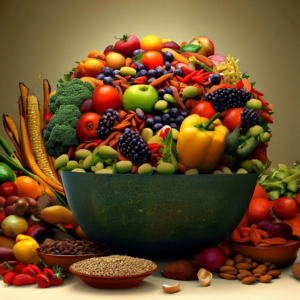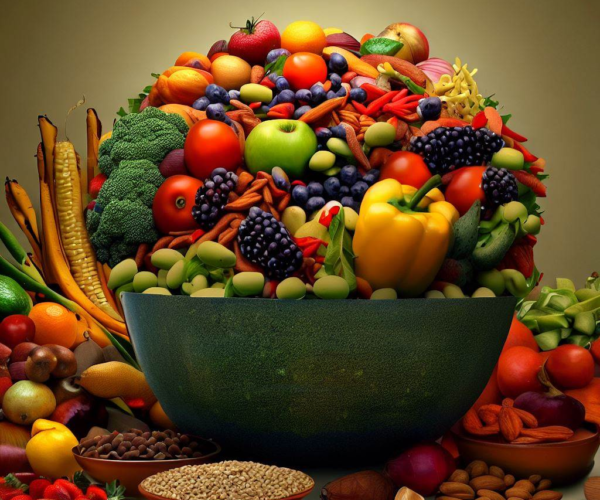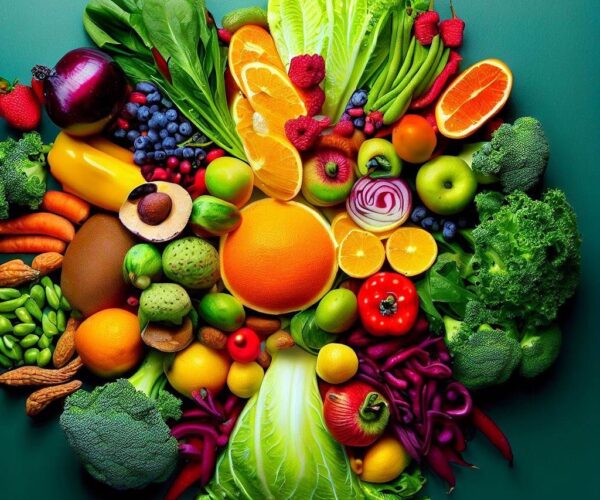Are you looking to improve your overall health and well-being? Incorporating more whole foods into your diet can be a great place to start.
Plant-based holistic nutrition is an approach that focuses on consuming foods in their natural, unprocessed state to provide the body with optimal nutrients and energy.
Whole foods are those that have not been heavily processed or stripped of their natural nutrients, such as fruits, vegetables, whole grains, nuts, and seeds. By incorporating more of these nutrient-dense foods into your diet, you may experience benefits such as improved digestion, increased energy levels, better mental clarity and focus, and reduced risk of chronic diseases.
However, transitioning to a plant-based diet can seem daunting at first. In this article, we will explore tips for incorporating more whole foods into your diet and overcoming common challenges along the way.
The Benefits of Plant-Based Holistic Nutrition
 Get ready to discover the amazing advantages of embracing a diet rich in natural, unprocessed ingredients! A plant-based holistic nutrition approach provides numerous benefits for your health and wellbeing.
Get ready to discover the amazing advantages of embracing a diet rich in natural, unprocessed ingredients! A plant-based holistic nutrition approach provides numerous benefits for your health and wellbeing.
One of the key benefits is that it promotes a healthy weight by providing you with nutrient-dense foods that are low in calories. With a focus on wholesome fruits, vegetables, whole grains, and legumes, you can reduce your risk of chronic diseases such as heart disease and cancer.
The importance of variety in a plant-based diet can’t be overstated. By consuming a wide range of colorful fruits and vegetables, you can ensure that you’re getting all the vitamins, minerals, and antioxidants your body needs to function optimally.
Holistic nutrition also plays an important role in disease prevention by addressing not just your physical health but also your emotional and spiritual wellbeing. This means taking care of every aspect of yourself – including stress management, sleep quality, hydration levels – to keep illnesses at bay.
Incorporating more plant-based whole foods into your diet may seem daunting at first. However, making small changes over time can lead to significant improvements in your overall health. Start by gradually swapping out processed foods for whole food alternatives like quinoa instead of white rice or kale chips instead of potato chips.
Experiment with new recipes and flavor combinations to make healthy eating enjoyable and sustainable for the long term. Remember that this journey is about progress, not perfection – so be kind to yourself along the way!
Understanding Whole Foods and Their Nutritional Value
To truly nourish your body, you need to understand the nutritional value of whole foods and how they can benefit you both physically and mentally.
Whole food sources are those that are unprocessed or minimally processed, such as fruits, vegetables, whole grains, nuts, seeds, and legumes. These foods are naturally nutrient-dense and provide a wide range of vitamins, minerals, antioxidants, fiber, and other beneficial phytochemicals.
In contrast to highly processed foods that often contain added sugars, unhealthy fats, salt, and preservatives – which can be detrimental to your health – whole foods offer your body everything it needs to function optimally. They help boost energy levels by providing sustained fuel for the body throughout the day while also promoting healthy digestion.
Incorporating more whole foods into your diet is also associated with lower risk of chronic diseases such as heart disease, diabetes, and some cancers. By understanding the nutritional value of different types of whole foods you can start making informed choices about what you eat.
For example, dark leafy greens like kale or spinach contain high amounts of vitamin K which is important for bone health; berries are packed with antioxidants that protect against cellular damage; legumes like beans or lentils provide an excellent source of plant-based protein along with fiber and complex carbohydrates that help keep blood sugar levels stable throughout the day.
Incorporating these nutritious whole foods into your meals will not only improve your physical health but also support mental clarity and overall well-being.
How to Transition to a Plant-Based Diet
If you’re looking to switch up your eating habits and embrace a healthier lifestyle, there are some simple steps you can take to start incorporating more plant-based options into your meals.
One way is to gradually replace meat with plant-based protein sources such as beans, lentils, tofu, tempeh or quinoa. These foods are rich in protein and other essential nutrients that are important for maintaining good health.
Another way is to experiment with new recipes that feature whole foods as the main ingredient. There are countless delicious plant-based recipes available online that utilize ingredients such as vegetables, fruits, nuts and seeds.
You can also try making your own meal replacements like smoothie bowls or salads loaded with different types of veggies and toppings like avocado or hemp seeds.
Transitioning to a plant-based diet doesn’t have to be difficult or overwhelming. Start by incorporating small changes into your daily routine until they become habits. Over time, you’ll find that you crave healthy foods more often and feel better overall.
Remember to listen to your body’s signals and adjust accordingly – everyone’s nutritional needs are different!
Tips for Meal Planning and Preparation with Whole Foods
You’re going to love these game-changing tricks for whipping up easy, delicious meals using only the freshest ingredients straight from your kitchen – they’ll knock your socks off!
Time-saving techniques are essential when it comes to meal planning and preparation. To make things easier for you, try prepping your ingredients in advance. For instance, chop up vegetables such as onions and carrots and store them in airtight containers until you need them. This way, you can save time during hectic weeknights by having all of your ingredients ready to go.
Another budget-friendly option is to plan your meals around seasonal produce that’s readily available at local farmers’ markets. Not only will this help you save money on groceries, but it will also give you an opportunity to experiment with new flavors and recipes. You can even consider buying items like grains and beans in bulk to further reduce costs.
When it comes to meal preparation, think outside the box! Incorporate whole foods into classic dishes like stir-fry or tacos for a healthy twist on old favorites. Don’t be afraid to get creative with spices and herbs either – they can add a ton of flavor without adding extra calories or sodium.
Plus, when you’re cooking with fresh ingredients, the possibilities are endless! With these tips in mind, meal planning and preparation can become fun instead of overwhelming.
Overcoming Common Challenges and Sticking to Your New Diet
Sticking to your new healthy lifestyle can be challenging, but with a little determination and planning, you can overcome common obstacles and enjoy all the benefits of a nutritious diet.
One key to success is practicing mindful eating. This means paying attention to your body’s hunger cues, slowing down while you eat, and savoring each bite. By doing this, you’ll feel more satisfied after meals and less likely to overeat.
Another challenge that often arises when following a plant-based holistic nutrition plan is navigating social situations. Whether it’s a family gathering or dinner out with friends, it can be difficult to find suitable options on the menu or deal with unsupportive comments from others.
To overcome this hurdle, do some research beforehand and suggest restaurants that offer plant-based options or bring a dish to share at family events. Remember that sticking to your goals is about prioritizing your health and wellbeing above all else.
Finally, remember that it’s okay if you slip up occasionally. Nobody’s perfect! If you find yourself indulging in less-than-nutritious foods or skipping workouts for a few days in a row, don’t beat yourself up over it.
Instead, focus on getting back on track as soon as possible by meal planning for the week ahead or scheduling time for exercise in your calendar. With patience and persistence, you’ll soon find that living a plant-based holistic lifestyle becomes second nature.
How many servings of fruits and vegetables should I aim to eat daily?
The general recommendation is 5-9 servings per day, but who wants to be average? Get creative with your meals and find ways to incorporate more fruits and veggies into your diet. Add berries to your morning smoothie or sneak some spinach into your pasta sauce. The possibilities are endless!
So go ahead and indulge in that colorful produce section at the grocery store – your body (and taste buds) will thank you.
Can I still get enough protein on a plant-based diet?
To answer your question, yes, you can still get enough protein on a plant-based diet.
There are plenty of protein alternatives to meat and dairy products that are rich in essential amino acids. Some examples include lentils, chickpeas, tofu, tempeh, nuts, seeds, quinoa and edamame.
Incorporating these into your meals can help ensure that you’re getting enough protein in your diet. Protein-rich meals can be made with these ingredients by adding them to stir-fries, salads or soups as well as making bean burgers, lentil stews or roasted chickpea bowls.
With some planning and creativity in the kitchen, a plant-based diet can provide ample amounts of protein for optimal health and wellness.
What are some non-dairy sources of calcium?
Looking for some non-dairy sources of calcium? No problem! There are plenty of vegan sources of calcium that can help keep your bones strong and healthy.
Calcium-rich plant-based foods include leafy greens like kale, collard greens, and spinach, as well as fortified plant milks and tofu made with calcium sulfate. Nuts and seeds like almonds, sesame seeds, and chia seeds are also great sources of this mineral.
So whether you’re lactose intolerant or just looking to cut back on dairy, there are plenty of ways to get the calcium your body needs on a plant-based diet.
How can I ensure I am getting enough iron in my diet without meat?
To ensure you’re getting enough iron in your diet without meat, focus on incorporating iron-rich plant-based foods into your meals. Some great options include dark leafy greens like spinach and kale, beans and lentils, tofu and tempeh, quinoa, nuts, and seeds.
It’s also important to note that plant-based sources of vitamin B12 can be limited, so consider taking a supplement or consuming fortified foods like plant milks or breakfast cereals to meet your daily needs.
With a little planning and creativity in the kitchen, it’s completely possible to thrive on a plant-based diet while still meeting all of your nutritional needs.
Are there any supplements I should consider taking on a plant-based diet?
When switching to a plant-based diet, it’s important to ensure you’re getting all the necessary nutrients. While whole foods should always be your main source of nutrition, there are some top plant-based supplements that can help fill in any gaps.
One great option is vitamin B12, which is often lacking in vegan diets and plays a crucial role in energy production and nerve function. Another popular supplement is omega-3 fatty acids, which are essential for brain health and can be found in algae-based supplements rather than fish oil capsules.
The benefits of plant-based supplements over animal-based ones include being more environmentally friendly and often easier on the digestive system. So if you’re considering adding some extra support to your plant-based lifestyle, these supplements may be worth incorporating into your routine.
As you continue on this journey, remember that it’s okay to fall off track and indulge in less healthy options occasionally. However, don’t let these slip-ups discourage you from continuing to prioritize whole foods in your daily meals.
Keep in mind all the benefits that come with a plant-based holistic nutrition approach: improved digestion, increased energy levels, reduced risk of chronic diseases, and much more.
Incorporating more whole foods into your diet may seem daunting at first, but with time and effort, it’ll become second nature. Remember to take advantage of meal planning and preparation tips to make eating whole foods easier and more convenient for you.
And most importantly, be kind and patient with yourself as you navigate this new lifestyle change. With dedication and determination, you can achieve optimal health through plant-based holistic nutrition.











